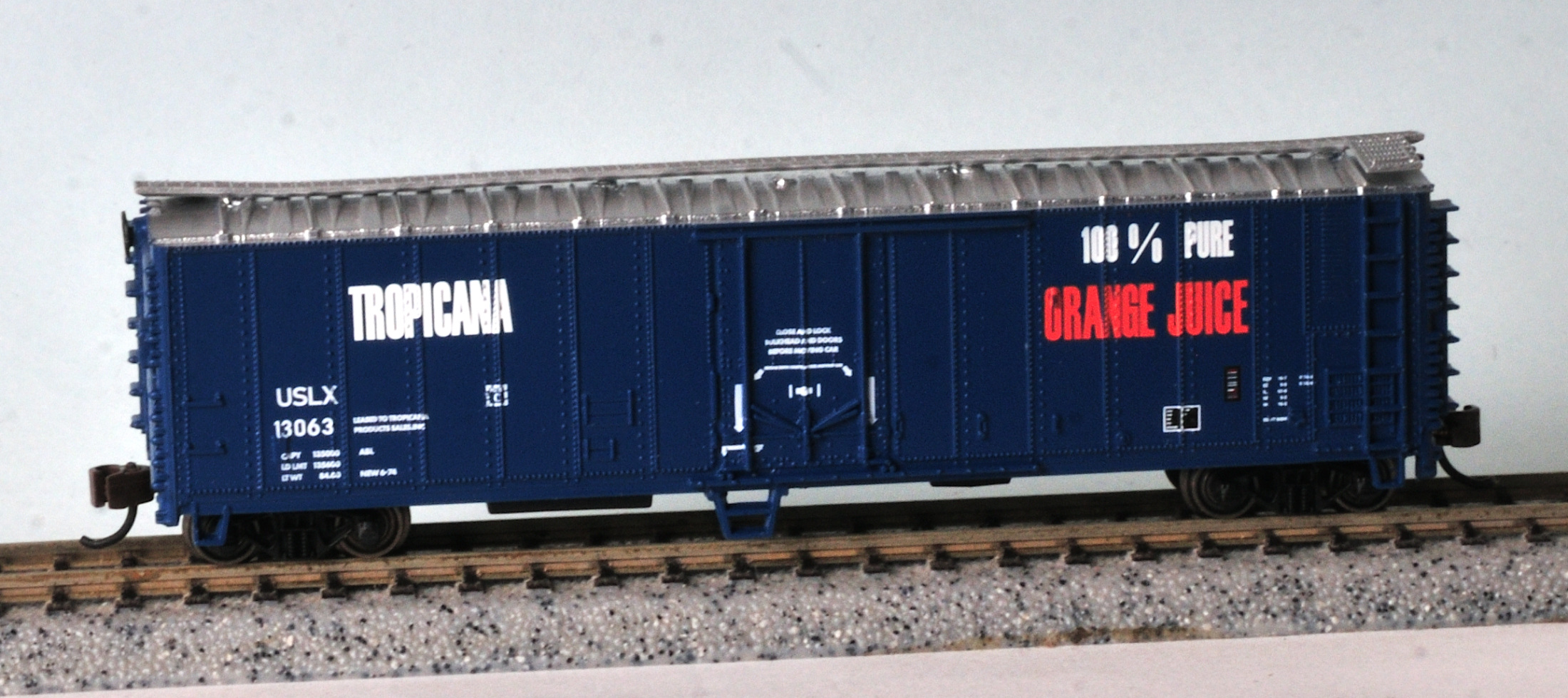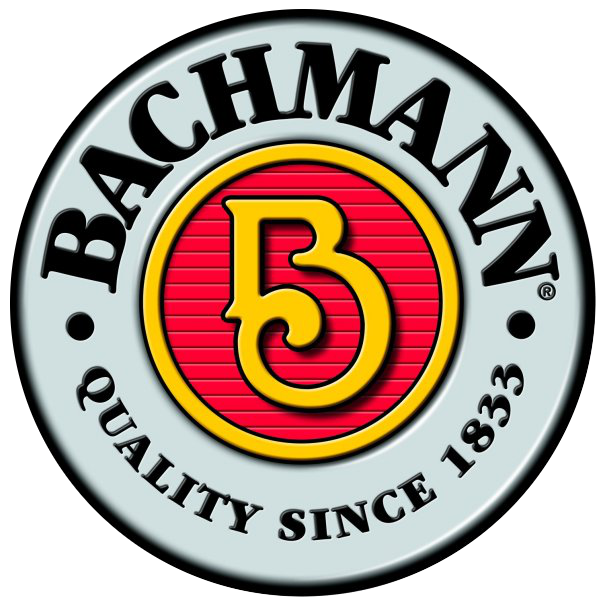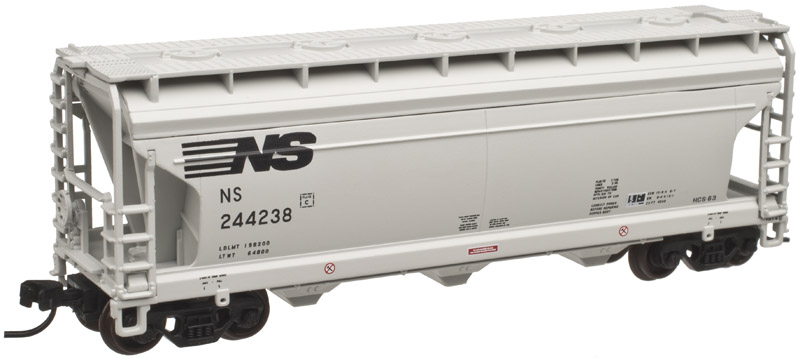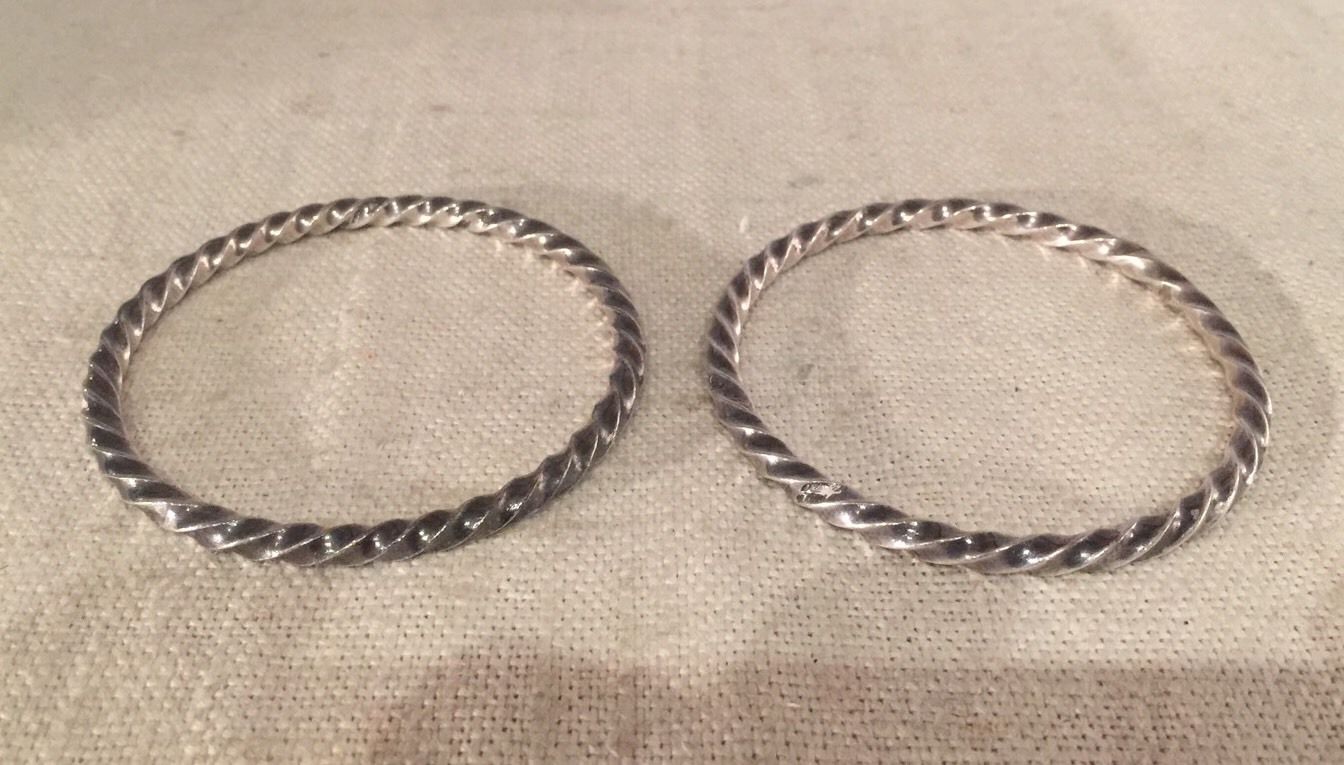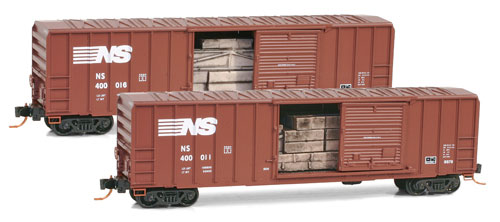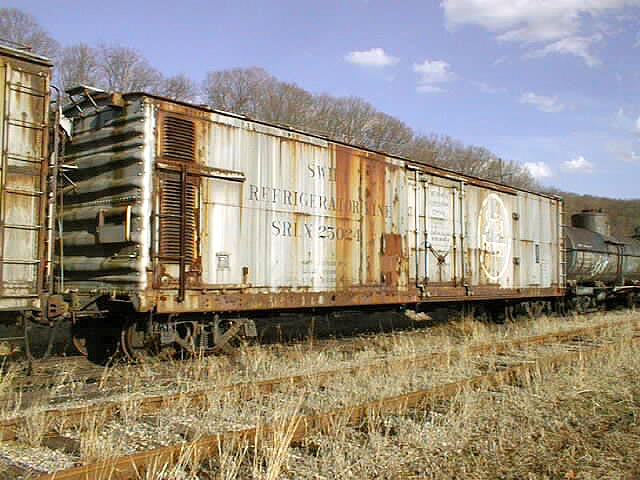Specific Item Information: ACF 50' Steel Reefer - Tropicana #13063 - N Scale. Refrigerated Boxcars (also known as Reefer Cars) are specially designed freight cars used to carry perishable goods at specific temperatures. Early wooden reefers gained popularity shortly after the Civil War and were mostly supplanted by lighter-weight steel reefers such as those shown here in the 1950s. Steel Reefers had a profound impact on the transportation and availability of perishable food products. Their cooler temperatures and better insulation ensured that perishable loads could remain fresh for longer, and therefore could reach further destinations than ever before. Many first-generation steel reefers were later retrofitted with mechanical cooling units. These improvements led to the development of the first specialty produce train in 1970, with Tropicana running an exclusive "Juice Train" from Florida to New Jersey, for onward distribution - a practice which it still relies on to this day. The Bachmann 50' Steel Reefer replicates cars in service from the 1950s through the 1970s and features blackened metal wheels, and E-Z Mate® Mark II couplers, with a range of vibrant, authentic paint schemes from which to choose. New and existing tooling. Equipped with body-mounted E-Z Mate® Mark II couplers.
Prototype History: The purpose of a mechanical reefer is to keep perishable items cold. Early reefers were of all wood construction and used ice for cooling. By the 1940s, new reefers were being built entirely of steel. Insulating techniques improved to the point where economical refrigeration could be accomplished using steel side plates in place of wood sheathing. Fifty foot mechanical reefers date back to at least the late 50s / early 60s.
The mechanical reefers could keep a more regular temperature, and often times colder than what the ice bunker cars were capable of. Initially mechanical reefers were used primarily in frozen food service. This would soon change as mechanical refrigeration began to replace ice-based systems. Soon after, mechanical refrigeration units replaced the “armies” of personnel required to re-ice the cars.
The first record of a 50' mechanical refrigerator car with a 6' plug door appears in the October 1954 Official Railway Equipment as with reporting marks FGEX 1000 - 1100. The January 1958 Official Railway Equipment Register lists over 600 of these cars. They appear with road numbers between 1000 and 1600. The build dates will fall between these two dates.
They were first acquired for orange juice service out of Florida. Similar cars were owned by WFEX and BREX. All were used in pool service with one another, depending upon the season. You can find a remaining prototype preserved in the NC Transportation Museum in Spencer, NC.
The mechanical reefers could keep a more regular temperature, and often times colder than what the ice bunker cars were capable of. Initially mechanical reefers were used primarily in frozen food service. This would soon change as mechanical refrigeration began to replace ice-based systems. Soon after, mechanical refrigeration units replaced the “armies” of personnel required to re-ice the cars.
The first record of a 50' mechanical refrigerator car with a 6' plug door appears in the October 1954 Official Railway Equipment as with reporting marks FGEX 1000 - 1100. The January 1958 Official Railway Equipment Register lists over 600 of these cars. They appear with road numbers between 1000 and 1600. The build dates will fall between these two dates.
They were first acquired for orange juice service out of Florida. Similar cars were owned by WFEX and BREX. All were used in pool service with one another, depending upon the season. You can find a remaining prototype preserved in the NC Transportation Museum in Spencer, NC.
Road Name History: Tropicana Products, Inc. is an American multinational company which primarily makes fruit-based beverages. It was founded in 1947 by Anthony T. Rossi in Bradenton, Florida. Since 1998, it has been owned by PepsiCo. Tropicana's headquarters are in Chicago, Illinois. The company specializes in the production of orange juice.
The Tropicana story begins with Anthony T. Rossi, who arrived in the U.S. with just $25 in his pocket. He founded Tropicana in 1947 with the mission of making the goodness of the finest fruit accessible to everyone. He developed flash pasteurization and pioneered orange juice transport in 1970 via train from Florida to New York. As Tropicana continues to grow, we have Anthony Rossi to thank for creating the spirit of innovation and fresh thinking that continues at Tropicana today.
From Wikipedia
The Tropicana story begins with Anthony T. Rossi, who arrived in the U.S. with just $25 in his pocket. He founded Tropicana in 1947 with the mission of making the goodness of the finest fruit accessible to everyone. He developed flash pasteurization and pioneered orange juice transport in 1970 via train from Florida to New York. As Tropicana continues to grow, we have Anthony Rossi to thank for creating the spirit of innovation and fresh thinking that continues at Tropicana today.
From Wikipedia
Brand/Importer Information: Bachmann Industries (Bachmann Brothers, Inc.) is a Bermuda registered Chinese owned company, globally headquartered in Hong Kong; specializing in model railroading.
Founded in Philadelphia, Pennsylvania, the home of its North American headquarters, Bachmann is today part of the Kader group, who model products are made at a Chinese Government joint-venture plant in Dongguan, China. Bachmann's brand is the largest seller, in terms of volume, of model trains in the world. Bachmann primarily specializes in entry level train sets, and premium offerings in many scales. The Spectrum line is the high quality, model railroad product line, offered in N, HO, Large Scale, On30, and Williams O gauge all aimed for the hobbyist market. Bachmann is the producer of the famous railroad village product line known as "Plasticville." The turnover for Bachmann model trains for the year ended 31 December 2006 was approximately $46.87 million, a slight increase of 3.36% as compared to 2005.
Founded in Philadelphia, Pennsylvania, the home of its North American headquarters, Bachmann is today part of the Kader group, who model products are made at a Chinese Government joint-venture plant in Dongguan, China. Bachmann's brand is the largest seller, in terms of volume, of model trains in the world. Bachmann primarily specializes in entry level train sets, and premium offerings in many scales. The Spectrum line is the high quality, model railroad product line, offered in N, HO, Large Scale, On30, and Williams O gauge all aimed for the hobbyist market. Bachmann is the producer of the famous railroad village product line known as "Plasticville." The turnover for Bachmann model trains for the year ended 31 December 2006 was approximately $46.87 million, a slight increase of 3.36% as compared to 2005.
Item created by: CNW400 on 2022-12-29 10:57:11. Last edited by George on 2024-01-02 15:49:37
If you see errors or missing data in this entry, please feel free to log in and edit it. Anyone with a Gmail account can log in instantly.
If you see errors or missing data in this entry, please feel free to log in and edit it. Anyone with a Gmail account can log in instantly.


